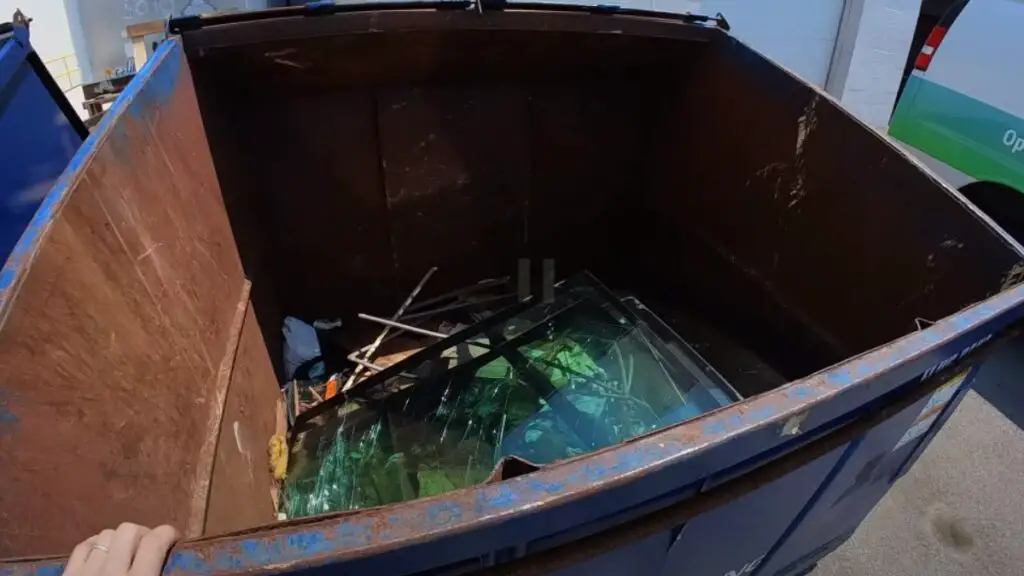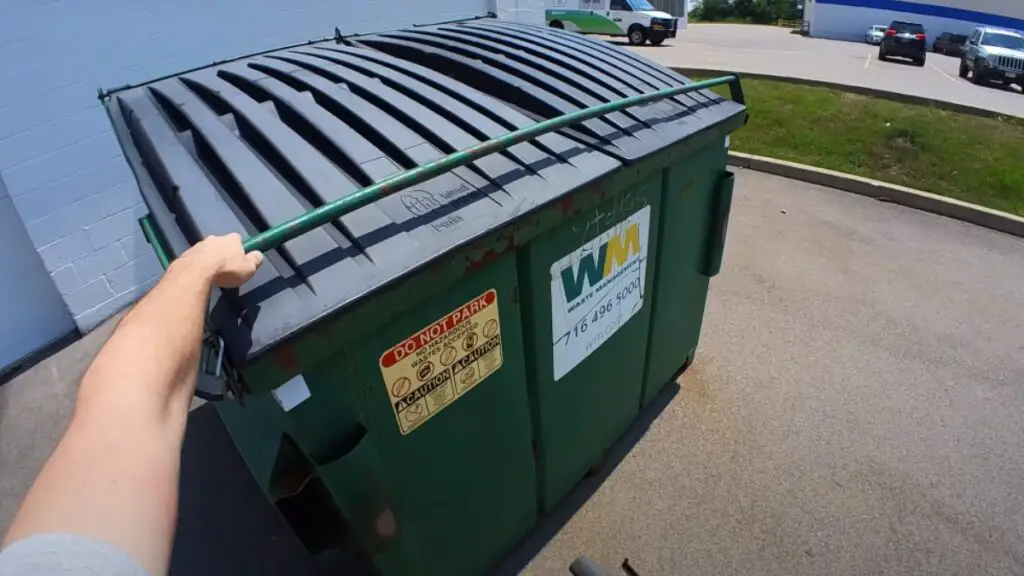In the state of California, dumpster diving is an activity engaged in by a diverse range of individuals.
While some undertake it out of necessity, others see it as an eco-conscious alternative to traditional consumption, a way to combat the waste produced by our throwaway culture.
The question arises if this practice is legal in California.
In this article, we will dive into whether it is legal or not and the potential of dumpster diving in California.
Dumpster Diving In California

According to a 2019 survey, nearly 14% of homeless individuals in California resort to dumpster diving as a primary means of subsistence.
For others, it’s a strategic method to reduce waste and promote sustainability in a state that generated nearly 77.2 million tons of waste in 2017, as reported by CalRecycle.
However, it’s important to consider the legal and health implications of dumpster diving.
While it’s not explicitly illegal in California, trespassing on private property to access waste can lead to legal repercussions.
Is Dumpster Diving Legal In California?
In California, the legality of dumpster diving is not explicitly defined, but it’s essential to note that it can potentially fall under legal gray areas.
If a dumpster is on private property, diving could be considered as trespassing.
According to Penal Code Section 602 in California, trespassing can lead to a fine of up to $1,000 or imprisonment for up to six months.
Moreover, the act of dumpster diving becomes illegal if it involves identity theft or the misuse of personal information found in the trash, as per the California Identity Theft Laws (Penal Code 530.5 PC).
Violation of this law could incur a fine of up to $1,000 and imprisonment for up to a year.
It’s also worth noting that local ordinances may have specific rules regarding dumpster diving.
For example, in the city of Fresno, Municipal Code Section 6-501 makes it illegal to remove anything from a recycling bin.
Hence, it’s always advisable to research local laws and ordinances before engaging in dumpster diving.
Is Dumpster Diving Illegal In California At Night?
In California, dumpster diving is not explicitly illegal statewide, regardless of the time of day.
However, it’s crucial to note that individual cities or areas may enforce their own regulations.
For instance, dumpster diving at night could potentially be interpreted as suspicious activity or trespassing.
Especially if performed on private property or in gated areas without permission, which could lead to legal consequences.
Moreover, the legality can also be affected by what one does with the found items. However, using discovered information for identity theft is definitively illegal.
Therefore, while dumpster diving might not be illegal in and of itself, specific actions related to it can place one on the wrong side of the law.
Always remember to respect private property rights and prioritize safety when considering dumpster diving.
If you have any doubts about the legality in your particular location, it’s always best to consult with a legal expert or your local authorities.
Is It Illegal To Go Through Someone’s Trash In California?
According to California law, specifically under California Penal Code Section 602, trespassing is a criminal offense.
But when it comes to rummaging through someone else’s trash, the legal parameters become a bit murky.
The landmark case of California v. Greenwood in 1988 clarified this issue. The U.S. Supreme Court ruled that there is no expectation of privacy for discarded materials.
Therefore, once an individual throws something out, it is considered public domain and is fair game for anyone, including law enforcement.
However, if the trash is still within the property boundaries (e.g., a curbside bi), attempting to access it could potentially lead to a trespassing charge.
Dumpster Diving Laws In California
In California, the act of dumpster diving, or scavenging through other people’s trash for usable items, falls within a gray area of the law.
The landmark Supreme Court case California v. Greenwood in 1988 determined that individuals do not have a reasonable expectation of privacy for disposed items.
Therefore, dumpster diving is generally not considered illegal at the federal level or in California state law.
However, this practice may violate municipal codes or local ordinances in certain cities.
For example, in Los Angeles, Municipal Code Section 66.32 prohibits removing items from recycling bins.
Moreover, if a dumpster is on private property, diving could potentially lead to trespassing charges.
As per Penal Code Section 602, trespassing is a misdemeanor in California, with penalties including up to six months in county jail or a fine of up to $1,000.
It’s recommended to ask permission from the property owner prior to rummaging through the trash.
Lastly, while dumpster diving can be a source of valuable finds, it’s essential to remember that it can also pose safety and health risks.
As per figures from the Consumer Product Safety Commission, an estimated 6,100 individuals were treated in hospital emergency rooms for injuries related to trash bins and dumpsters between 1993 and 2018.
Best Places To Dumpster Dive In California?
California is a diverse state offering numerous dumpster diving opportunities.
Firstly, consider the dense, urban areas like San Francisco, Los Angeles, and San Diego.
These cities, known for their large population and high consumerism, often discard valuable items in their dumpsters.
Next, check out college towns such as Berkeley, Davis, or Palo Alto.
At the end of each semester, especially in May and December, students often dispose of usable items like furniture, small appliances, and books.
Lastly, explore affluent neighborhoods in California like Beverly Hills, Pacific Heights, and La Jolla. These areas are known to toss out high-quality goods.
So, if you are planning to dumpster dive at Arizona, Mississippi, or Nevada; you should check these state laws before going to your hunt.
How Much Money Can You Make Dumpster Diving In California?
In California, dumpster diving can indeed be a source of supplementary income, but the exact amount varies greatly based on time commitment, location, and luck.
In populous urban areas with a high concentration of retail stores, some dedicated dumpster divers have reported earnings of up to $2500 a month, mainly from selling discarded items in good condition.
However, this figure is typically on the higher end. A more modest and realistic expectation might be an extra $200-$500 a month.
These figures represent the potential earnings from reselling recoverable items and do not take into account any associated costs such as transportation, cleaning, or repairing.
It’s important to remember, though, that dumpster diving isn’t just about the financial aspect; many also embrace it as a lifestyle choice to counteract waste and consumption.
What Are The Safety Precautions For Dumpster Diving In California?
Dumpster diving, or salvaging through waste for usable items, while not illegal in California, requires certain safety precautions to ensure a risk-free experience.
1. Wear Protective Gear
It is essential to equip yourself with thick gloves, sturdy shoes, and long-sleeved clothes to protect against sharp objects or harmful substances.
2. Use Tools
A grabbing tool or a stick can help sift through trash without direct contact, reducing the risk of injuries.
3. Avoid Private Property
Dumpster diving is legal in California, except when dumpsters are on private property. Trespassing laws are enforceable, so stick to public dumpsters or get permission.
4. Avoid Chemical Waste
Avoid dumpsters marked with biohazard symbols or any signs of chemical waste. Exposure to these materials can be harmful.
5. Respect the Law
In California, dumpster diving is governed by the California Public Resources Code Section 41950-41962. It’s crucial to be familiar with these laws before starting.
6. Clean Finds Thoroughly
Any items you find should be cleaned thoroughly to eliminate potential bacteria or germs.

Frederick Perez is the founder of Scrape Dude. He loves exploring and finding hidden treasures in unexpected places. Frederick has been dumpster diving and gold panning for years, turning his hobby into our website to share his adventures. He’s known for his friendly advice and exciting stories, inspiring others to discover the joy in these unique hobbies. His expertise makes Scrape Dude a trusted and fun place to learn and explore.


